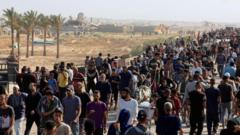A father’s grief over losing his son in a violent Israeli airstrike highlights the escalating humanitarian crisis in Gaza, drawing international attention to the plight of civilians amidst ongoing conflict.
Gaza Tragedy: Outrage Following Israeli Strike that Killed Children at Water Distribution Point

Gaza Tragedy: Outrage Following Israeli Strike that Killed Children at Water Distribution Point
Father of slain boy demands accountability as violence extends humanitarian crisis in Gaza.
Mahmoud Abdul Rahman Ahmed's life took a tragic turn on Sunday when his son, Abdullah, was killed while seeking water at a distribution point in Nuseirat refugee camp. As a result of the strike, 10 individuals, including six children, lost their lives, and 16 others were left injured, according to local hospital reports.
Mahmoud described the desperate situation for residents who are contending with severe water shortages and the repercussions of the ongoing siege. "Abdullah was only searching for a sip of water," he lamented, emphasizing the desperation faced by families forced to queue daily for scarce resources. His claims reflect broader concerns about the humanitarian crisis deepening in Gaza as the conflict drags on.
Graphic footage captured the immediate aftermath of the bombing, showing the chaos and destruction. Eyewitness accounts reveal scenes of panic, with rescuers scrambling to help the injured while searching for survivors in the rubble.
The Israeli military acknowledged that a "technical error" led to the munition missing its intended target, which they claimed was a "terrorist." This admission, however, has done little to quell the outrage among local communities and humanitarian organizations. Mahmoud asserted that the airstrike was not merely a tragic mistake, but rather indicative of a strategy that conveys an alarming message: that basic human needs, like drinking water, are under threat.
United Nations officials have expressed grave concerns over the deteriorating conditions in Gaza. A spokesperson for the UN agency for Palestinian refugees noted the severity of the water crisis, stating that many residents receive far below the emergency standard of water. The situation is compounded by ongoing military operations and a lack of resources to maintain essential services.
Further compounding the tragedy, reports indicate that children have consistently been the victims of the ongoing conflict. The UN has indicated that an average of a classroom full of children have been killed on a daily basis since the war began.
Calls for accountability are mounting, with organizations such as UNICEFF demanding rigorous reviews of military engagement protocols to prevent future civilian casualties. Meanwhile, Israel's representative to the UN has shifted the blame to Hamas, arguing that the group is using civilians as shields.
As international attention turns to the plight of Gazan children, Mahmoud's call for an end to the violence reflects a yearning for peace among civilians who feel powerless in the face of ongoing hostilities. "This war needs to stop," he urged.
The UN Security Council is set to convene soon to address the circumstances surrounding civilian harm in the region, yet deep divides remain regarding the source of responsibility and solutions for the ongoing crisis.
Mahmoud described the desperate situation for residents who are contending with severe water shortages and the repercussions of the ongoing siege. "Abdullah was only searching for a sip of water," he lamented, emphasizing the desperation faced by families forced to queue daily for scarce resources. His claims reflect broader concerns about the humanitarian crisis deepening in Gaza as the conflict drags on.
Graphic footage captured the immediate aftermath of the bombing, showing the chaos and destruction. Eyewitness accounts reveal scenes of panic, with rescuers scrambling to help the injured while searching for survivors in the rubble.
The Israeli military acknowledged that a "technical error" led to the munition missing its intended target, which they claimed was a "terrorist." This admission, however, has done little to quell the outrage among local communities and humanitarian organizations. Mahmoud asserted that the airstrike was not merely a tragic mistake, but rather indicative of a strategy that conveys an alarming message: that basic human needs, like drinking water, are under threat.
United Nations officials have expressed grave concerns over the deteriorating conditions in Gaza. A spokesperson for the UN agency for Palestinian refugees noted the severity of the water crisis, stating that many residents receive far below the emergency standard of water. The situation is compounded by ongoing military operations and a lack of resources to maintain essential services.
Further compounding the tragedy, reports indicate that children have consistently been the victims of the ongoing conflict. The UN has indicated that an average of a classroom full of children have been killed on a daily basis since the war began.
Calls for accountability are mounting, with organizations such as UNICEFF demanding rigorous reviews of military engagement protocols to prevent future civilian casualties. Meanwhile, Israel's representative to the UN has shifted the blame to Hamas, arguing that the group is using civilians as shields.
As international attention turns to the plight of Gazan children, Mahmoud's call for an end to the violence reflects a yearning for peace among civilians who feel powerless in the face of ongoing hostilities. "This war needs to stop," he urged.
The UN Security Council is set to convene soon to address the circumstances surrounding civilian harm in the region, yet deep divides remain regarding the source of responsibility and solutions for the ongoing crisis.


















